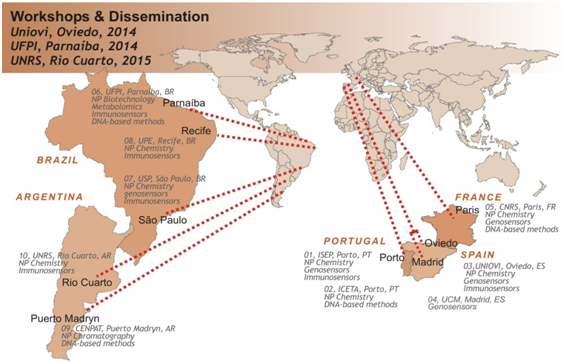 Exchange Scheme
Exchange Scheme Within the content of GMOsensor project an extended scientific network of ten educational and research entities from Europe and South America will be established. The selection of the particular groups of the network has been based upon the concept of facilitating the scientific demands and objectives of the project. In particular, five institutes from Europe and five institutes from South America will participate in the project, namely:
(P1) REQUIMTE, Instituto Superior de Engenharia do Porto (Portugal) - ISEP
(P2) REQUIMTE, Instituto de Ciências e Tecnologias Agrárias e Agro-Alimentares (Portugal) - ICETA
(P3) Universidad de Oviedo (Spain) - UNIOVI
(P4) Universidad Complutense de Madrid (Spain) - UCM
(P5) Université de Paris Diderot /CNRS (France) - CNRS
(P6) Universidade Federal do Piauí (Brazil) - UFPI
(P7) Universidade de S. Paulo- S. Carlos (Brazil) - USP
(P8) Universidade de Pernambuco (Brazil) - UPE
(P9) Centro Nacional Patagónico (Argentina) - CENPAT
(P10) Universidad Nacional de Río Cuarto (Argentina) – UNRC

The GMOsensor project relies on the collaboration of a total number of 46 researchers, from which 28 are experienced researchers (ER), the majority belonging to the staff of the universities/institutes, 17 are early stage researchers (ESR), some of them are PhD students and others are Master students, and 1 technical staff (TS). In particular, 25 researchers from EU and 21 from South America will work in the project. The proposed mobility takes into account the experience of each investigator and especially the knowledge of the host institution where the work will be performed. The promotion of exchanges intends to create synergies, allowing to, substantially, increase the potential of each isolated group and the overall results of the whole team in general. Aiming at the efficient interaction between the participants and the successful accomplishment of the project goals, the proposed activities have been organised in work packages involving well defined tasks in a successive manner. The organisation of the tasks also took into account the expertise of each group in order to maximise their skills and knowledge, creating a strong partnership network in the area of this project. Additionally, with the purpose of ensuring an efficient transfer of knowledge, during the two years planned for the project, a total of three workshops will be organised, two in South America and one in Europe, related to the scientific areas of expertise of the participating groups. The programs of these workshops must include training sessions with experimental part and panel discussion topics.